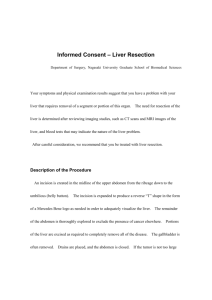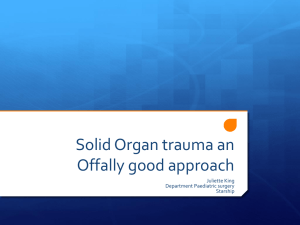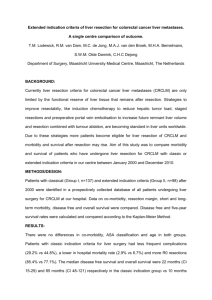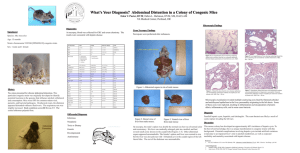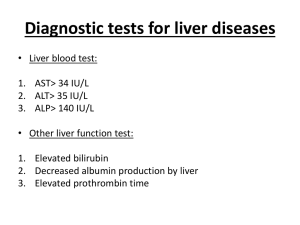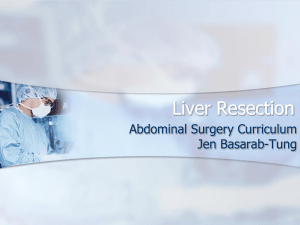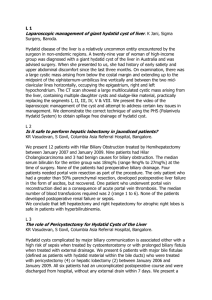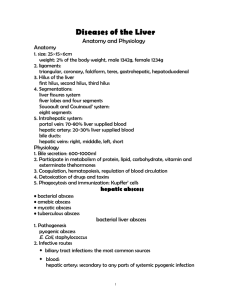Informed Consent – Liver Resection
advertisement
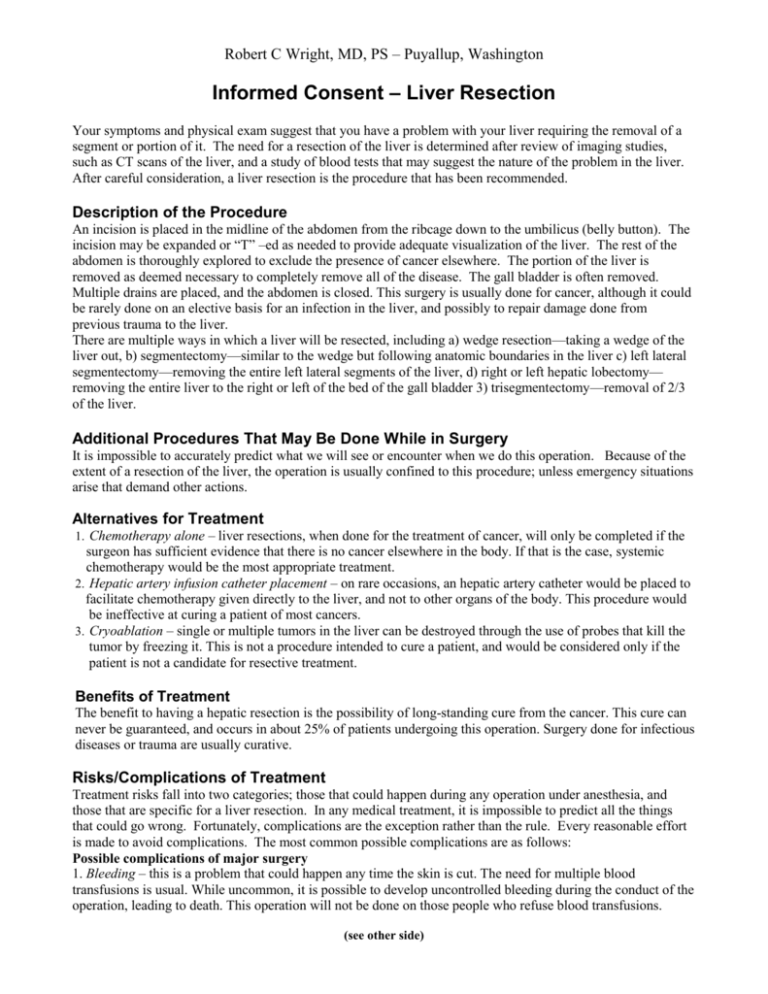
Robert C Wright, MD, PS – Puyallup, Washington Informed Consent – Liver Resection Your symptoms and physical exam suggest that you have a problem with your liver requiring the removal of a segment or portion of it. The need for a resection of the liver is determined after review of imaging studies, such as CT scans of the liver, and a study of blood tests that may suggest the nature of the problem in the liver. After careful consideration, a liver resection is the procedure that has been recommended. Description of the Procedure An incision is placed in the midline of the abdomen from the ribcage down to the umbilicus (belly button). The incision may be expanded or “T” –ed as needed to provide adequate visualization of the liver. The rest of the abdomen is thoroughly explored to exclude the presence of cancer elsewhere. The portion of the liver is removed as deemed necessary to completely remove all of the disease. The gall bladder is often removed. Multiple drains are placed, and the abdomen is closed. This surgery is usually done for cancer, although it could be rarely done on an elective basis for an infection in the liver, and possibly to repair damage done from previous trauma to the liver. There are multiple ways in which a liver will be resected, including a) wedge resection—taking a wedge of the liver out, b) segmentectomy—similar to the wedge but following anatomic boundaries in the liver c) left lateral segmentectomy—removing the entire left lateral segments of the liver, d) right or left hepatic lobectomy— removing the entire liver to the right or left of the bed of the gall bladder 3) trisegmentectomy—removal of 2/3 of the liver. Additional Procedures That May Be Done While in Surgery It is impossible to accurately predict what we will see or encounter when we do this operation. Because of the extent of a resection of the liver, the operation is usually confined to this procedure; unless emergency situations arise that demand other actions. Alternatives for Treatment 1. Chemotherapy alone – liver resections, when done for the treatment of cancer, will only be completed if the surgeon has sufficient evidence that there is no cancer elsewhere in the body. If that is the case, systemic chemotherapy would be the most appropriate treatment. 2. Hepatic artery infusion catheter placement – on rare occasions, an hepatic artery catheter would be placed to facilitate chemotherapy given directly to the liver, and not to other organs of the body. This procedure would be ineffective at curing a patient of most cancers. 3. Cryoablation – single or multiple tumors in the liver can be destroyed through the use of probes that kill the tumor by freezing it. This is not a procedure intended to cure a patient, and would be considered only if the patient is not a candidate for resective treatment. Benefits of Treatment The benefit to having a hepatic resection is the possibility of long-standing cure from the cancer. This cure can never be guaranteed, and occurs in about 25% of patients undergoing this operation. Surgery done for infectious diseases or trauma are usually curative. Risks/Complications of Treatment Treatment risks fall into two categories; those that could happen during any operation under anesthesia, and those that are specific for a liver resection. In any medical treatment, it is impossible to predict all the things that could go wrong. Fortunately, complications are the exception rather than the rule. Every reasonable effort is made to avoid complications. The most common possible complications are as follows: Possible complications of major surgery 1. Bleeding – this is a problem that could happen any time the skin is cut. The need for multiple blood transfusions is usual. While uncommon, it is possible to develop uncontrolled bleeding during the conduct of the operation, leading to death. This operation will not be done on those people who refuse blood transfusions. (see other side) 2. Infection – we take special care to prevent an infection, but it is always a possibility. This may require more surgery if an abscess develops. 3. Reactions to medication – this could be many things, from a minor rash to possible death. 4. Reactions to anesthesia and surgery – this could show up as a heart attack, blood clots, pneumonia, sore throat, or potential death, in rare cases. 5. Poor wound healing – breakdown of the incision. Possible complications of a hepatic resection 1. Hepatic Failure – removal of portions of the liver may lead to inability of the rest of the liver to compensate and result in jaundice, hepatic failure, and sometimes death. 2. Injury to the bile ducts – because the operation occurs close to the bile ducts, an injury to them (while uncommon) is possible. Such an injury may not be detected while in the operating room, and necessitate further operations to be corrected. 3. Bowel or abdominal organ injury—an injury to a portion of the intestines, pancreas, or other abdominal organs is uncommon but possible. Should this occur, we will repair the injury. Re-operation may be required. Anticipated Recovery/Expected Rehabilitation Recovery is quite variable, depending on the individual. Hospitalization lasts from between 10 days to a month. After that time, full recovery sufficient to permit one to return to work or normal activities will be quite variable, with between one to three months before a person is able to eat well, and carry out normal activities. If further treatment, such as chemotherapy or radiation is needed, this will delay return to normal activities. Consent for Treatment I understand my condition to be a mass in the liver and am aware of its risks if untreated. I have read and understand the above explanation of the operation required. My surgeon has answered my questions, and I choose to proceed with surgery. I understand that every operation may yield unexpected findings. I give the surgeon permission to act on his best judgment in deciding to remove or biopsy tissues that appear to be diseased, understanding that complications may arise from that action. I understand that while most people receiving a hepatic resection may benefit from this operation, I may not. My condition may not improve, and it may worsen. No absolute guarantee can be made. HIPAA: Before and after surgery, unless otherwise requested in writing by you, visitors whom you invite to attend the surgery will be informed of the surgical finding, your surgical status, and anticipated recovery issues, for effectiveness of communications. Because of the anesthetic, you may or may not remember these important details PRINT NAME__________________________________________________________________________ SIGNATURE ______________________________________________ DATE _________________ WITNESS ________________________________________________ DATE _________________ SURGEON ________________________________________________ DATE _________________ RELATIONSHIP TO PATIENT IF SIGNATURE OF LEGAL GUARDIAN ________________________________ I waive the right to read this form, and do not want to be educated and informed of treatment risks; nonetheless I understand the need for this surgery and grant permission to the surgeon to proceed on my behalf. SIGNATURE _____________________________________________________ DATE ______________ Rev11/04pjd
